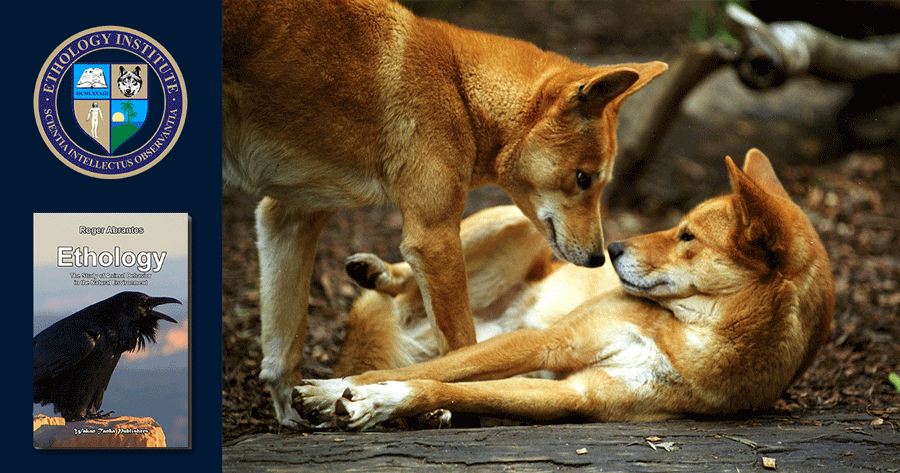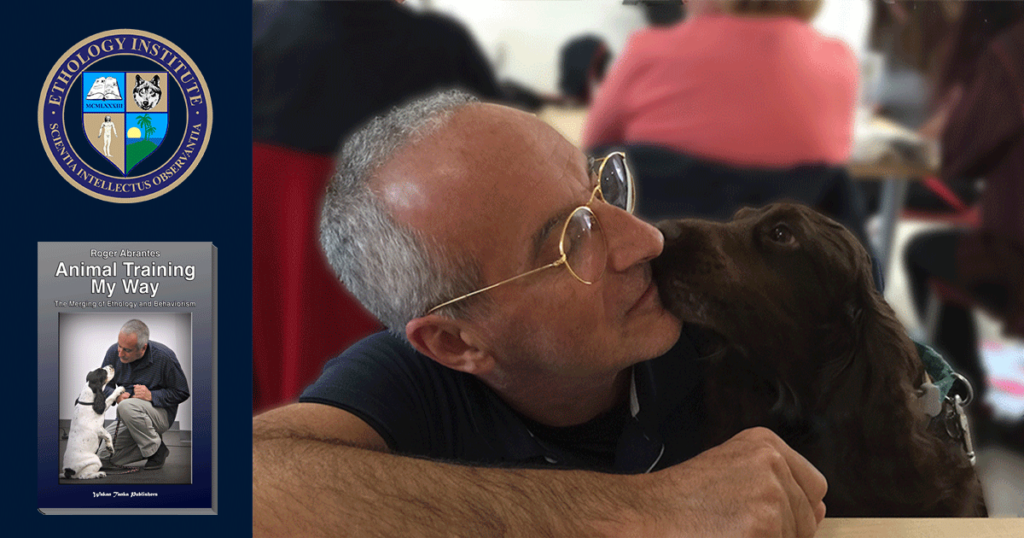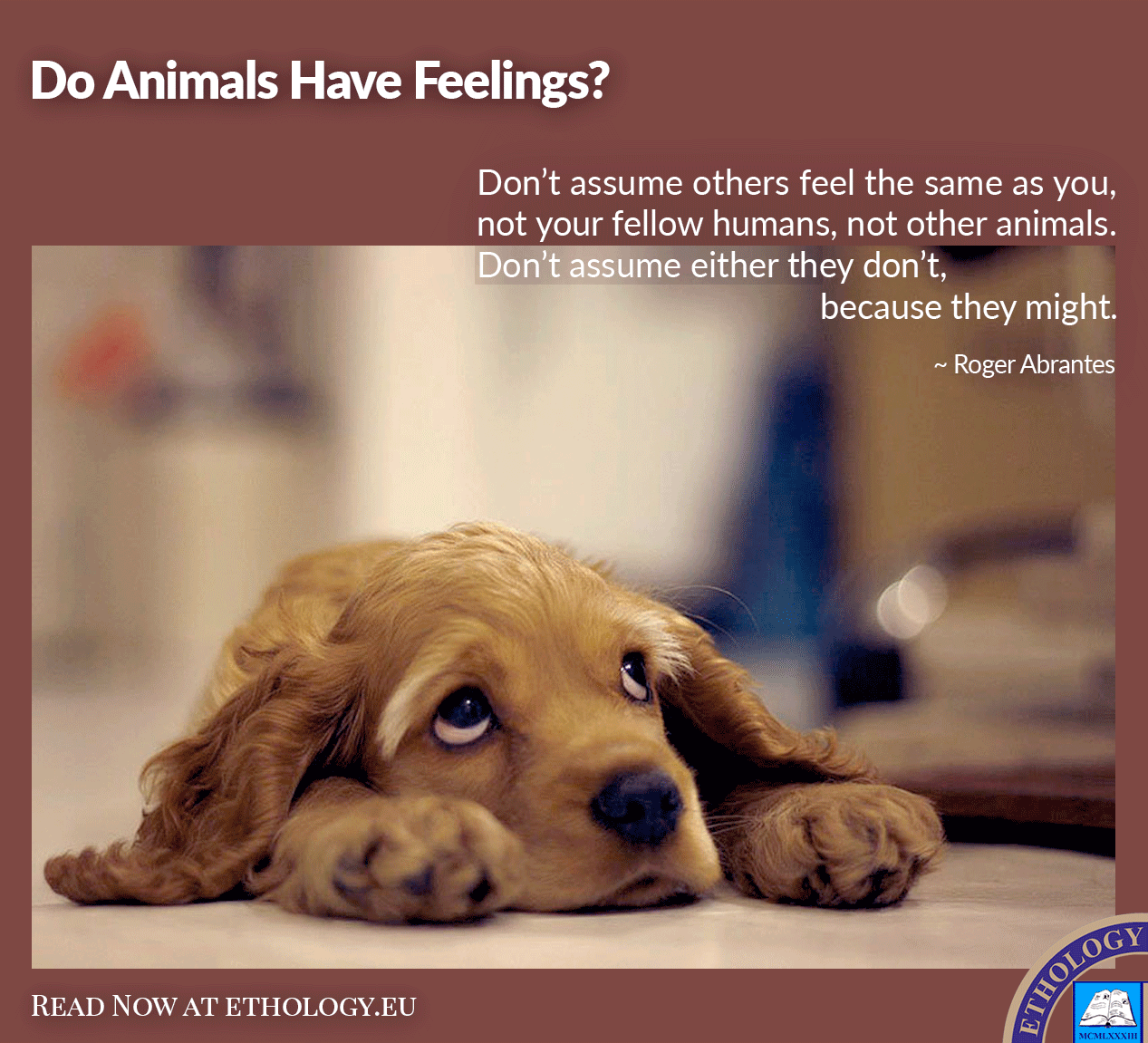Do Animals Have Feelings? Attributing human characteristics to non-human animals is wrong — no doubt about that. Furthermore, it seems to me, that the opposite (of anthropomorphism) is as wrong, that is, to say that animals cannot be happy or sad because these are human emotions. It is true that we can’t prove whether an animal is happy or sad, but we can’t prove either that it can’t. As Carl Sagan wrote, “Absence of evidence is not evidence of absence.” We know nothing about one or the other. All we can see is behavior, and the rest is guesswork.
The argument for anthropomorphism is valid enough: if I can’t prove (verify) something, I’d better disregard it (at least scientifically); and I can’t prove that my dog is happy, sad, or loves me.
Then again, we are not better off with our spouses, children, friends, not to speak of strangers. What do we know about their feelings and emotions? We can’t prove either that they are happy, sad, or love us. We presume it (and we are often wrong) because we compare their behavior with our own when we are in notably similar states of mind.
You may argue that there is a difference between comparing humans with one another, and humans with other animals. We, humans, are, after all, members of the same species. It appears to make sense to presume that if I am sad when I show a particular behavior, then you are also unhappy when you show similar behavior. You may have a point, even though not a very scientific one—and certainly not always. Cultural diversities play us, as you know, many tricks. Some expressions cover entirely different emotions in distinct cultures.
Featured Course of the Week
Ethology Ethology studies animal behavior in its natural environment. It is one of the fundamental courses in your curriculum. A reliable knowledge of animal behavior is the basis to create a satisfying relationship with any animal we train.
Featured Price: € 168.00 € 98.00

It appears that our attributing feelings to others, e.g., being happy or sad, is not very scientific. It is more a case of empathy, or being able to set ourselves in the place of the other individual. Researchers have uncovered that other primates besides humans, as well as other mammals, show empathy. Recent studies have found that honeybees are capable of indicating a kind of emotional response; and honey-bees, as invertebrates, account for about 95% of all species.
It seems the only reason for my inference that someone feels something particular is by resemblance. If so, I fail to see why we cannot accept that animals (at least some species) also can be happy, sad, etc. The inter-species comparison is a more distant one, but are we not, ultimately, sons and daughters of the same DNA?
If we can’t prove that everyone experiences emotions similarly enough to allow us to attribute them to a particular category, it seems to me to make no sense to accept a claim based on the fact that because humans know of love, happiness, and sadness, other animals (absolutely) don’t.
Again, “A difference of degree, not of kind,” as Charles Darwin wrote, appears to me to be a prudent and wise approach; and to reserve further judgment until we can prove it.
Therefore, if it is a sin to attribute human characteristics to other animals, it must also be a sin to say that because we do, they don’t, because we can, they can’t. The first is, as we know, called anthropomorphism; the second, I will coin anthropodimorphism.
So, if you ask me, “Can my dog be happy or sad?” I will ask you back, “Can you?” If you answer, “Yes, of course,” then I’ll say, “If that is the case, so can your dog (probably) albeit differently from you—a difference of degree, not of kind.”
Bottom-line: don’t assume others feel the same as you, not your fellow humans, not other animals. Don’t assume either that they don’t, because they might.
Life is a puzzle, enjoy it!
Featured image: Don’t assume others feel the same as you, not your fellow humans, not other animals. Don’t assume either they don’t, because they might.
Learn more in our course Ethology and Behaviorism. Based on Roger Abrantes’ book “Animal Training My Way—The Merging of Ethology and Behaviorism,” this online course explains and teaches you how to create a stable and balanced relationship with any animal. It analyses the way we interact with our animals, combines the best of ethology and behaviorism and comes up with an innovative, yet simple and efficient approach to animal training. A state-of-the-art online course in four lessons including videos, a beautiful flip-pages book, and quizzes.

